#Princess Eboli
Text
SHIRLEY VERRETT
Soprano & MezzoSoprano
as Princess Eboli in VERDI'S Don Carlo
Born May 31st, 1931, New Orleans, USA 🇺🇸
Happy Birthday!!! 🌸🎂🍰🎂🌸🎂🍰🎂🌸

SHIRLEY VERRETT
Soprano & MezzoSopran
as Princess Eboli in VERDI'S Don Carlo
Born May 31st, 1931, New Orleans, USA 🇺🇸
Happy Birthday!!! 🌸🎂🍰🎂🌸🎂🍰🎂🌸
#shirley verrett#mezzosoprano#opera#super star#verdi#Don Carlo#Soprano#Brilliant Black Artists#Happy Birthday#Princess Eboli
6 notes
·
View notes
Text
youtube
Speaking of weird Don Carlo synopses, I think in this one nothing is really wrong (except for super anachronistic flags for the countries but w/e) but the emphasis is just so wildly off... As if the iconic part of this opera that everyone cares about is the pure innocent love between Elisabeth and Carlos...
#funnily enough that is in fact the case in saint real's don carlos novel which was the source material for schiller#like he goes on and on about the love story and how pure it is#but in schiller / verdi i don't get the feeling you're meant to cheer for them#even ignoring the whole gay aspect#verdi don c#also I like how nobody looks anything like the historical person but the princess of eboli gets her eyepatch
3 notes
·
View notes
Text
don carlos by friedrich schiller is the most wild thing i've read all year and i'm only in act 2
#this is giving me flashbacks to when i read the winter's tale and i was literally slamming my fists and emphatically shaking the book#because i just could not believe the level of DRAMA i was reading (and the craft with which it was written)#i just closed act 2 scene 3 and im like GIRRRRLLLLL#princess of eboli im rooting for you#nobody tell me if something shitty happens w her im having a good time right now#tales from diana#up until act 2 scene 2 i was getting phaedra-meets-prince hal (of the henry iv plays) vibes#but then those next two scenes were CRAAAAZY#and i should mention phaedra by racine is one of my favorite plays#schiller also has a beautiful skill at language if the translations are doing him any justice#i dont know german so im not reading the originals naturally but just. the edition i have. the verse is so beautiful#i also read his mary stuart this year and it was also great but im losing my mind at don carlos#i was intimidated by this play too though bc it's nearly 200 pages in my copy of his works! which is a p big book#but OOOHHHHH my god#im just over 1/3rd through the play and i cant imagine how it gets any wilder#but wooooow. WOWWWW#schiller might be the first non-anglophone writer ive read who ive seen called 'the shakespeare of his culture'#and i actually felt that the comparison like. did justice.#the intensity ive felt reading these 2 schiller plays are very much how i feel reading the greatest shakespeare plays#not that the greatest/most acclaimed writers of other languages ive read arent AS GREAT as shakespeare#but like. molière i'll use as an example bc i love what i've read of him.#he's the most globally well-known french writer of verse plays but that doesn't make him like shakespeare.#he's very much in his own camp of artistic genius. his craft is also very different. the resulting products are super unique#from what is typical of a shakespeare play.#schiller's style AT LEAST FROM THE TWO PLAYS IVE READ very much have the same depth of character#complexity of plot#and grace of verse.#im obsessed! king!
6 notes
·
View notes
Text
How John of Austrias friends and family react to him getting a girlfriend
Elisabeth Valois: OMG we just have to get together so we can meet her!
Alexander Farnese: Ahhh yeahh bro. Does she send nudes?
Duke of Alba: Do I look like I care?!
Ana Mendoza: I bet it’s because she looks like me
Don Carlos: HA! That’s gay!
Juana of Austria: What church does she go to?
Philip ii: I think it’s best I supervise all your dates so as to keep an eye out for any pre marital handholding
#John of Austria#Alexander Farnese#don Carlos#Juana of Austria#duke of Alba#philip ii#Philip ii of Spain#elisabeth de valois#elisabeth of valois#Isabel de Valois#princess of eboli#Ana mendoza#incorrect quotes#🤪
3 notes
·
View notes
Text
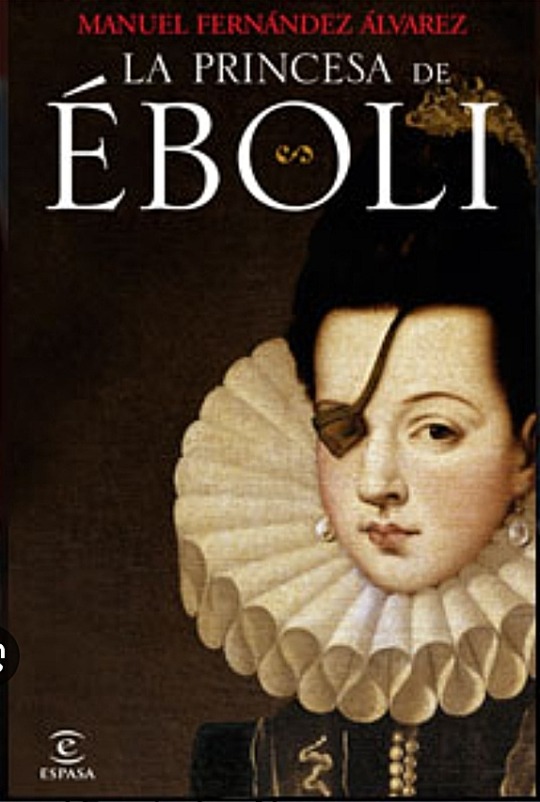
La princesa de Éboli es, sin duda, uno de los personajes más atractivos y controvertidos de la Corte de Felipe II. En parte por su inquietante belleza, que su famoso parche en el ojo derecho hacía más provocativa, pero sobre todo por ese vaivén de su fortuna de pasar de ser la principal dama de la Corte a la que muere, caída en desgracia, en la lóbrega prisión de Pastrana.
Nos atraen sus intrigas cortesanas, sus amoríos, sus despilfarros y, sobre todo, sus odios y sus amores. ¿Fue la amante del Rey? Al menos todo apunta a un trato íntimo con el monarca, pues era la gran amiga española de la joven reina Isabel de Valois. ¿Tuvo algún devaneo con don Juan de Austria? ¿Estuvo implicada en el asesinato de Escobedo? ¿Por qué Felipe II la condenó a reclusión perpetua? ¿De qué tenía miedo el Rey? ¿Qué le preocupaba de lo que pudiera decir Ana de Mendoza en un juicio público?
¿Temía que su relación con Antonio Pérez pusiera en peligro importantes secretos de Estado? Todas preguntas con difícil respuesta, pero de una cosa no nos cabe duda: el soberano quería a toda costa el silencio de la Princesa, incluso con su prisión. Una vida apasionante que Manuel Fernández Álvarez recrea para sus lectores.

De doña Ana Mendoza y de la Cerda, princesa de Éboli, dijo el artista contemporáneo español Alonso de Coloma (1532-1607) que fue la única mujer 'capaz de entretejer alrededor del cuello de todo un rey una soga hecha con pasiones que estuvo a punto de acabar con un gran imperio'. Protagonista clave en ese ambiguo y para muchos inexistente Renacimiento español de la segunda mitad del siglo XVI, doña Ana de Mendoza cubre con este libro biográfico el hueco que tenía pendiente con la historiografía moderna. Heredera única de una de las estirpes más importantes de su época, los Mendoza, en sus manos también llegó a poseer una de las fortunas más grandes de momento. Hermosa, cordial, cariñosa, amable, y al mismo tiempo intrigante ambiciosa, orgullosa, o codiciosa... son muchos los calificativos que se le pueden otorgar a la princesa de Éboli, la mejor prueba, quizá, de lo difícil que resulta definir a esta mujer a la que se le han atribuido amoríos con el propio monarca y, sobre todo, con uno de sus secretarios más importantes, Antonio Pérez.
1 note
·
View note
Text
My dad insisted I watch the opening of the season of La Scala di Milano with him and I braced myself for four hours of unintelligible warbling (I am not overly fond of opera as a rule). Ten minutes in and I was determined to watch it to the end because oh boy, Don Carlo by Verdi slaps.
My thoughts on what I watched so far:
Carlo and Rodrigo should kiss and it would solve 90% of their problems.
OMG THE COSTUMES ARE SO STUNNING I’M OBSSESSED
This princess of Eboli is scheming something ugly.
The Queen should elope with her handmaiden and it would solve 90% of her problems.
The SASS, the AUDACITY of Rodrigo is too great for this world. He tells the king to his face that he hopes History won’t remember him as Nero. I was gripping my seat.
This opera is so gay
#i watched it on the tv i feel i should say#i don’t have the money for a ticket for thf opening of the season at la scala#but it’s on my dream list for one day#don carlo#verdi#opera#classical music
23 notes
·
View notes
Text
Magic User Slapfight - Round 1


Sansa: art by starspilli, AWOIAF Page

Yna: Ana de Mendoza, Princess of Eboli, AWOIAF Page

BRACKET LINK
19 notes
·
View notes
Text
Don Carlo at the Bavarian State Opera
Music Direction Daniele Rustioni Producer Jürgen Rose Don Carlo Charles Castronovo Elisabeth of Valois Maria Agresta Filippo II John Relyea Rodrigo, Marquis of Posa Boris Pinkhasovich Princess Eboli Clémentine Margaine The Grand Inquisitor Dmitry Ulyanov | 28.07.2023
The grey and gloomy weather did not hinder the enthusiasm of the audience at the Bavarian State Opera, where they gathered to witness Jürgen Rose's masterful production of Don Carlo. I only managed to secure a standing place for this sold-out production. Nevertheless, it turned out to be an excellent location at a very reasonable price. My view remained mostly unobstructed, making it a better experience than the more expensive seat I had in Zürich.
The staging was simple, kept minimal for most of the time. The first scene started in the dark Fontainebleau forest, with a giant crucifix serving as the centerpiece and a constant reminder to the omnipotence of the catholic church in the storyline.
The best part of the staging was the auto-da-fé scene. The condemned heretics were tied up on a woodpile as the crowd sang the chorus. A red carpet was rolled out, welcoming the royal procession, followed by a parade depicting the Via Dolorosa, and ending with the presentation of La Pietà. The final scene of Act 3 peaked with the burning of the heretics (with REAL fire), which is often cowardly omitted by other productions. As the curtain dropped, it was greeted by a rapturous ovation from the audience (including me!).
It was a powerhouse presentation by the cast, but, in my opinion, the best performance award would go to Relyea as Filippo II. His commanding presence and emotive singing dominated every scene he was in. While Don Carlo is the title character, Filippo gets the best moments in the opera, from his iconic soliloquy to the duets with the other characters. This version also featured Lacrymosa, giving another opportunity for Relyea's Filippo to shine. I spoke to a young audience member during the intermission (we were probably the only ones who were still under 30). This was his third time seeing Don Carlo, and he said Relyea performed even better in München than in Covent Garden.
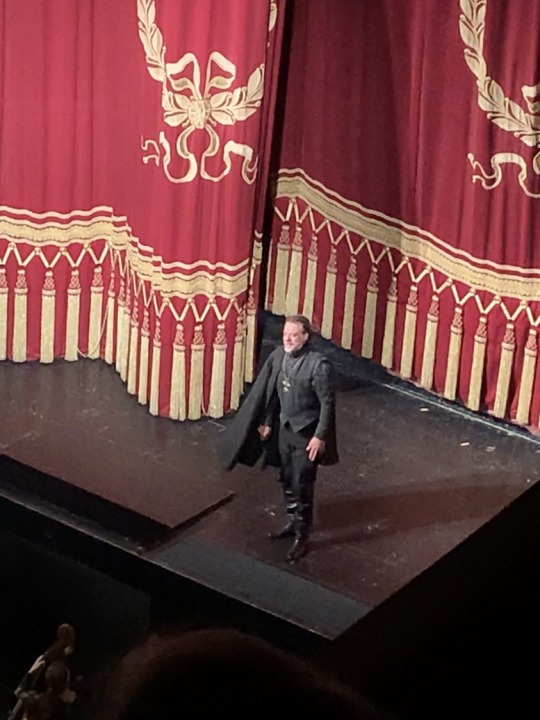
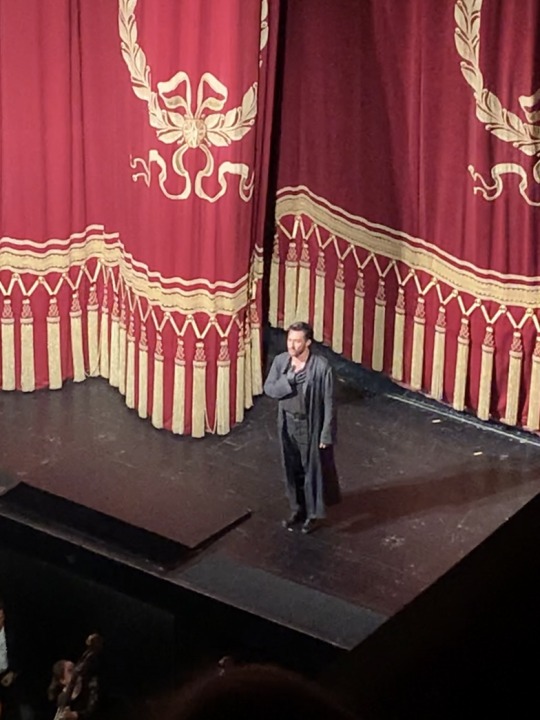

Castronovo and Agresta were solid as Carlo and Elisabeth, respectively. During the Fontainebleau duet, they constantly moved around the stage as if it was a rehearsed dance choreography, but it never looked unnatural.
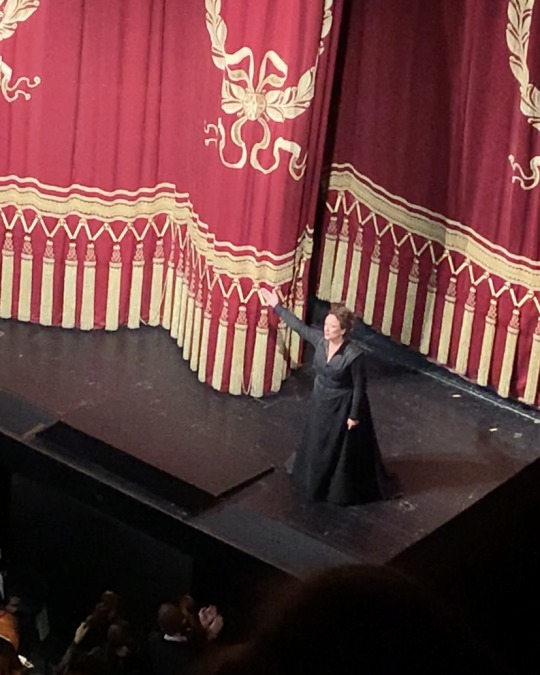

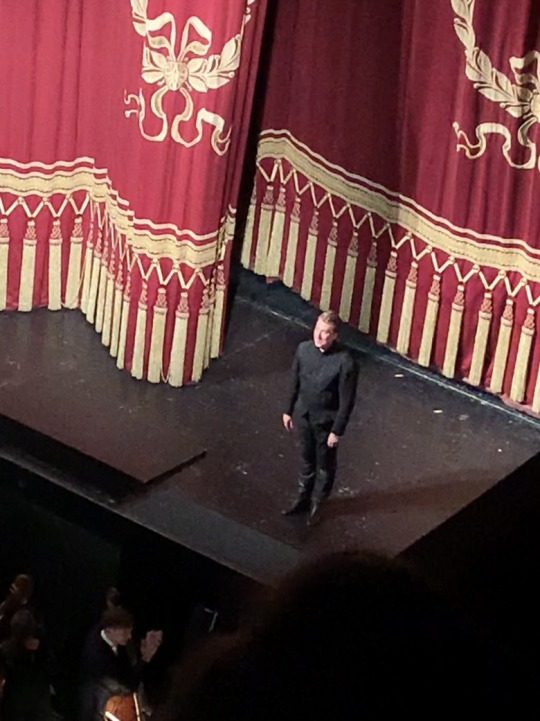
As much as I was disappointed by Tézier's withdrawal, Pinkhasovich was still a top-class replacement. The audience went wild at the end of his bromance duet with Castronovo's Carlo. Ulyanov delivered exquisite vocalism as the Grand Inquisitor, although he sounded younger than Relyea's Filippo. I don't want to label Margaine as the weakest link here, but I wish she had put more subtlety in her attempt at hitting those high notes. Nevertheless, she was dramatically excellent in the role of Eboli.
TL;DR: I would stand up for 4,5 hours all over again for this production and THIS cast!
#THIS IS A SUPER LATE POST that may have lost its relevance#but anyway here it is!#Carmen review is coming up... it two months time lol!#Verdi#Don Carlo#Don Carlos#opera diary#Charles Castronovo#Maria Agresta#John Relyea#Boris Pinkhasovich#Clémentine Margaine#Dmitry Ulyanov
15 notes
·
View notes
Photo
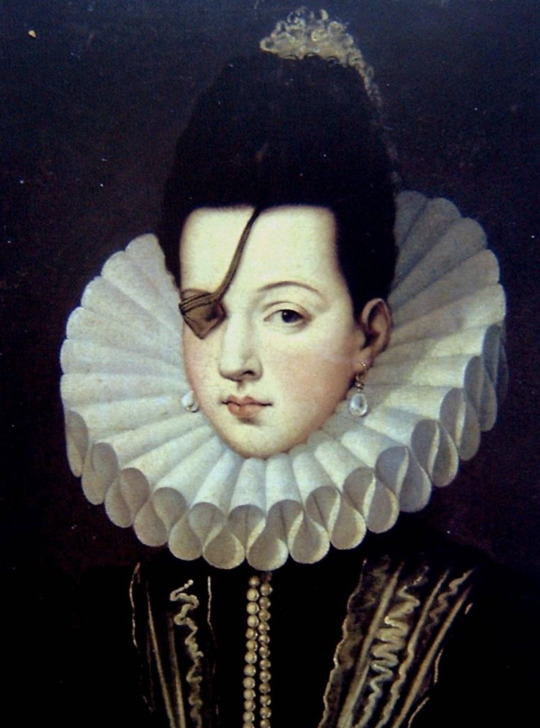
Sánchez-Coello (um 1531 - 1588) Ana de Mendoza, Princess of Eboli
....la Princesa fue encerrada en el Torreón de Pinto, prisión de nobles.
47 notes
·
View notes
Text
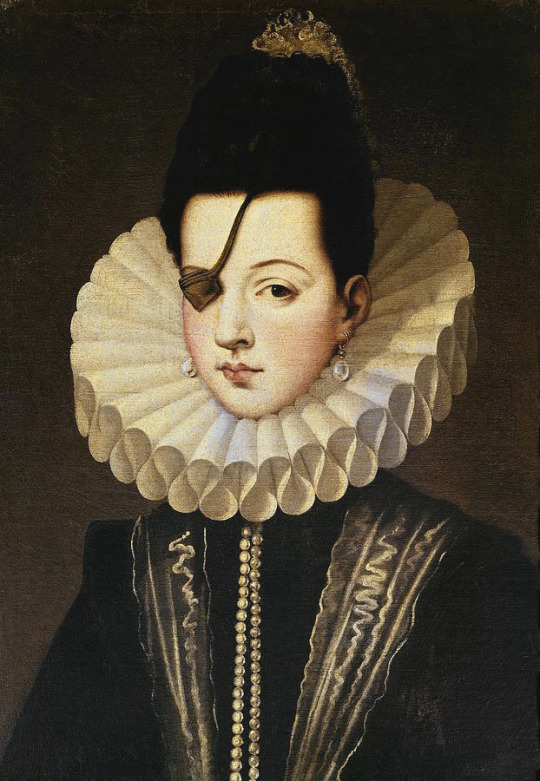
Alonso-Sanchez-Coello - Portrait of Ana-de-Mendoza, Princess-of-Eboli', 16th-century
104 notes
·
View notes
Text

My current audiobook. (Which is excellent by the way.) I may have just squealed a little at a one sentence mention of Princess Eboli.
4 notes
·
View notes
Text
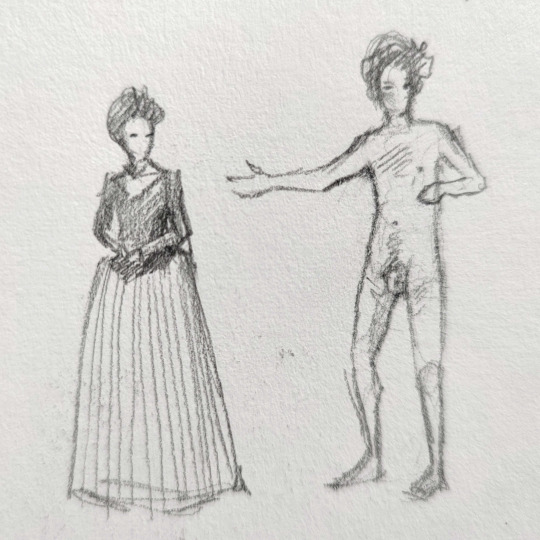
relatedly, something I saw at the Staatstheater
#schiller don c#the scene where carlos confides in the princess of eboli unwisely and in this case nakedly#it's not schauspiel if no-one gets naked#hbd schiller#a sketchbook to burn
3 notes
·
View notes
Photo

screenshot of tatiana troyanos as princess eboli in don carlo. one of her eyes is open and one is closed. comment, from R. Benedict Vergara, reads: “What’s up with that wonky eye? Did Gia Gunn do her makeup?”
3 notes
·
View notes
Text
A Rebel in an Eyepatch and Gown - Ana de Mendoza, the Princess of Eboli | Ancient Origins
1 note
·
View note
Text
ANA DE MENDOZA Y DE LA CERDA // PRINCESS OF EBOLI
“She was a Spanish aristocrat, suo jure 2nd Princess of Melito, 2nd Duchess of Francavilla and 3rd Countess of Aliano. She married Rui Gomes da Silva, 1st Prince of Eboli when she was 13 years old. She may have been blind in one eye but she was considered very attractive. She was an energetic person, and prominent in court life. One of her friends was the queen, Isabel de Valois. It is possible that Ana was the mistress of Philip II, King of Spain. Both she and the undersecretary of state, Antonio Perez, were accused of betraying state secrets which led to her arrest in 1579.”

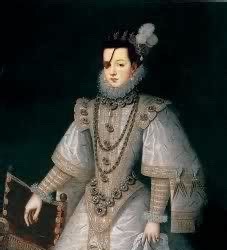
0 notes
Text
GIUSEPPE VERDI'S DON CARLO AT LA SCALA, DECEMBER 30, 2023
It feels somewhat inappropriate (or bad; or both) to turn into a stubborn remonstrance machine in front of a season opener—when everyone tends to be excited, nervous but high-spirited, positively curious, and wildly enthusiastic. Alas, I don’t think I can sweeten this pill that much; be prepared to endure a long series of mostly disapproving (not to mention monotonous) observations, or skip the whole of it and be back for the next one: either option is perfectly OK with me. Now that the warning bit is done, I’ll say this operatic experience was hurt by two major problems. The first one—it can be fully depicted by a two-word sweeping assessment: wrong language. (Stripping an opera of its original language—a practice that was pretty common in the perilous old days—has been a no-no for a long time. In other words, as a general rule, nobody’s translating Carmen, Lohengrin, Pelléas et Mélisande, or Jenůfa anymore. Yet for some reason, Giuseppe Verdi’s Don Carlos—first performed at l’Opéra [Salle Le Peletier] in 1867—is still considered fair game to this day. That’s what happened here: never mind Don Carlos, enter Don Carlo. It sort of puzzles me, ‘cause it’s truly like swinging the ax from The Shining and tearing a hole in your own boat immediately before the start of a rowing race you want to win).
The second problem has to be the theatrical numbness of the production created by Lluís Pasqual (with Daniel Bianco, Franca Squarciapino, Pascal Mérat as set/costume/light designers). A rigid display of generic, uninterrupted emphasis? That sounds accurate to me. Whatever the storyline would come up with (in fact: within the court of Philip II of Spain, a large-scale tangle of fierce power struggles, frustrated love, thirst for dignity and freedom, family plots, [more than] a touch of sadism, etc.)… Now what… Got it: whatever questions/themes/possibilities the narrative would come up with, the answer was always going to be the same: somebody standing right under the proscenium arch, accompanying his/her/their voice with stereotyped, exaggerated gestures—and nothing else. This kind of approach ended up placing a veil of apathy over this entire Don Carlo: a thick blanket that the orchestra conducted by Riccardo Chailly wasn’t quite able to lift. Their rendition of the score was a little on the automatic/impersonal side. It just didn’t seem to click with the peculiar qualities that separate Don Carlos from the rest of Verdi’s work.
I’m thinking of the slow-burning nocturnal atmosphere; the penchant for ambiguous psychologies; the unhurried investigation/exploration of theoretical issues (whereas actual events are regularly upstaged, or out of the picture altogether). The relatively flat outcome of the King’s famed insomnia-ridden soliloquy («Ella giammai m’amò! No! Quel cor chiuso m’è» [Act III]) would be a good example of this missed connection. On the other hand, the Quartet from the same act («Ah! Sii maledetto, sospetto fatale,» sung by the King, the Princess Eboli, Rodrigo and Elisabetta) was a spectacular highlight: an aerial exercise in sacred music between Georg Friedrich Händel and Richard Strauss. While all the actors/singers were hindered by the widespread stiffness I’ve tried to describe, I’d say Maria José Siri’s Elisabetta—in love with Don Carlo, but married to his old father, the King—was successful in portraying a transition, almost a metamorphosis. She starts out as a victim. She winds up as a victim, as well: but a completely different one (grown-up; wise in the least welcome way you could imagine). And it all materialized through her singing style. (I’m not sure this qualifies as a fun fact, but the first Marquis of Posa and the first Princess Eboli [Jean-Baptiste Faure and Pauline Guéymard-Lauters] went on to feature, one year minus two days later, same venue, in the world première of Ambroise Thomas’s Hamlet as Hamlet himself and Gertrude).
0 notes